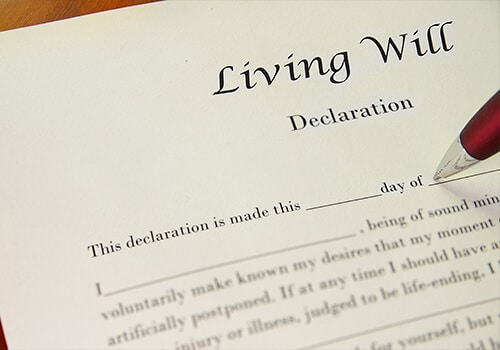It is a situation that most people do not want to think about, but many people face it every day. What would happen if you were in the position of not being able to make your own decisions about medical treatment?
Perhaps you are involved in an accident and incapacitated. Who is going to make those decisions about potential life-saving treatment? Do they know your wishes when it comes to health care?
With a living will, you can express your wishes and even appoint someone to make decisions for you.
This simple legal document can avoid disputes between family members and even court battles in some cases. If you have a last will, you should know it is not the same thing.
Keep reading as we explain everything you need to know about a living will, including how it works and how you can create one.
What Is A Living Will?
A living will is a legal document that informs hospitals or doctors about the type of treatment you wish to receive in life-threatening situations should you be unable to communicate your wishes.
This document might also be called an advanced directive or health care proxy in some states. A living will allows you to specify your wishes regarding things like life support or feeding tubes.
Your living will will only be consulted by your medical professional in the event of a life-threatening situation. If the problem is not life-threatening, these end-of-life decisions are generally unnecessary.
Without a living will, your family members might be left to make these medical decisions for you. This can lead to fighting among family members and even legal battles.
In the meantime, your medical care might be delayed while a court sorts out the arguments.
A living will is essential to estate planning, and you should ensure one is in place for important healthcare decisions. This prevents your loved ones from facing the difficult decision-making tasks associated with end-of-life care.
KEY TAKEAWAYS
- A living will allows you to dictate certain healthcare decisions ahead of time in case you become incapacitated.
- It would be best to appoint a healthcare agent who makes healthcare decisions for situations not covered in your living will.
- Family members may disagree on the best action for life-threatening situations without a living will. Sometimes, this even leads to court battles.
How To Make A Living Will
Making a living will or advance health care directive is not tricky. The specific process varies depending on the state in which you live, but the general process is the same.
- You must state your wishes in the document, sign it, and have it witnessed or notarized.
- You can also appoint a healthcare agent or healthcare proxy in the document.
- This agent can make health care decisions for you should a situation arise that is not otherwise covered in the document.
Some states allow you to create a document and list specific situations. Other states require that you use their approved state-specific form and fill in the blanks. Either way, an estate planning attorney can assist you with the proper procedures in your state.
You will want to ensure that the living will you create is valid so your health care providers will abide by it. This helps to ensure that your healthcare wishes will be carried out and gives you peace of mind that your family will not be forced to make those decisions.
It can also avoid emotional court battles over treatment decisions related to a terminal condition. As sad as it may seem, even life insurance can affect your family’s decision-making process, and they should not have to be put in that situation when it could be avoided.
Must read articles related to Wills & Trusts
- Overview of “What is a trust?“.
- Deep dive into how life insurance works.
- Discover what inheritance tax is.
- Understand what probate is and tips to avoid it.
- Learn the difference between a living trust and a will.
Situations Covered By A Living Will

A living will might cover many situations, but they generally involve a life-threatening situation.
Some of the more common situations include:
- The decision to receive certain types of life-sustaining care, such as electric shock, blood transfusions, dialysis, or tube feeding.
- In addition, a person may decide to include a “Do Not Resuscitate order (DNR)” in their living will. This is essentially a medical directive instructing caregivers not to perform resuscitation procedures in the event that their heart stops beating.
In most states, having a living will to establish a DNR order is unnecessary. You can inform your doctor or hospital; they generally have a form you can complete to establish this order.
- Another common situation is decisions about pain management and palliative care. While someone may not wish to have a feeding tube or other similar treatment, they may still want to receive pain medications to make their end of life as comfortable as possible.
- Living wills can also include instructions about organ donation after death.
- Finally, the document might also cover some situations that may not be considered life-threatening.
If a doctor has stated that the person is in a vegetative state or is unlikely to regain consciousness, the living will can still take effect even though no life-threatening injury took place.
TIP
A living will can also be referred to as an advanced directive or healthcare directive/proxy.
Power Of Attorney vs Living Will
A power of attorney and a living will are separate and distinct documents.
However, it is a good idea to have both in many cases. A standard power of attorney allows you to name someone who acts as your attorney. This person can act in your place regarding financial transactions or other business. You can grant the person general powers, allowing them to do anything you can legally do, or you can grant them specific powers for a particular transaction.
A healthcare power of attorney works with a living will. While your living will attempts to cover every possible healthcare situation, it is impossible to predict what might happen in the future.
These documents are sometimes called a durable power of attorney or medical power of attorney. The document allows you to name someone to make medical decisions on your behalf, and this document remains valid even if you become incapacitated. The person you name could be a spouse, other family member, friend, or anyone you trust to make these decisions on your behalf.
You might also hear about something called a living trust. This is another tool used in estate planning that must be created while you are still alive.
Many people choose to have both a living trust and a will. However, a living trust and a living will are different. A living trust, living will, and last will are three separate and distinct documents used for various purposes.
The Bottom Line
There is a big difference between a living will and a last will and testament.
Both documents are vital. A living will has legal power while you are still alive. A last will does not take effect until after your death.
You can use a living will to express your wishes regarding end-of-life health care. This ensures that your wishes are carried out and prevents your family from needing to make those difficult decisions. Some states require a living will form to be completed, while others allow you to draft your own.
You should consult an experienced estate planning attorney for assistance and to ensure that the correct documents are in place.
Frequently Asked Questions
Many people wonder about the differences between a living will and a will.
A living will is valid while you are still alive and is used to make health care decisions if you become incapacitated.
A will (or last will and testament), on the other hand, only takes effect after your death. The will is used to distribute your assets after death and guide your estate through the probate process.
You might hear some people use the term “living will and testament.” However, the “testament” portion is associated with a last will and not a living will, so that term is technically incorrect.
One of the most significant benefits of having a living will is that you can rest easy knowing that your wishes regarding your health care will be carried out.
You can also avoid situations where your family is stuck making difficult decisions regarding your health care treatment.
By making these decisions in advance, your family is not put in that difficult position, and you can rest easy knowing that your wishes will be adhered to.
Your living will have no effect after you die. However, there are a couple of exceptions.
- You can use a living will to leave your body to science and research or become an organ donor.
In that case, your living will would still have effect until the organ donation was completed.
But, at a high level, there are no more medical treatment decisions to be made after your death, so your living will would be of no use.
You can make a living will at any time as long as you are an adult of sound mind.
Once you become incapacitated, it is too late to make one. So, if you do not already have one, you should create one as soon as possible.
A living will is something that all adults should have as part of their estate plan.
Some people use an online will, but those are often not state-specific. You should always check with a local attorney when getting ready to write a will or create a living will.
You can find a Social Security Administration office near you by using our SSA office locator and searching for your closest location.





